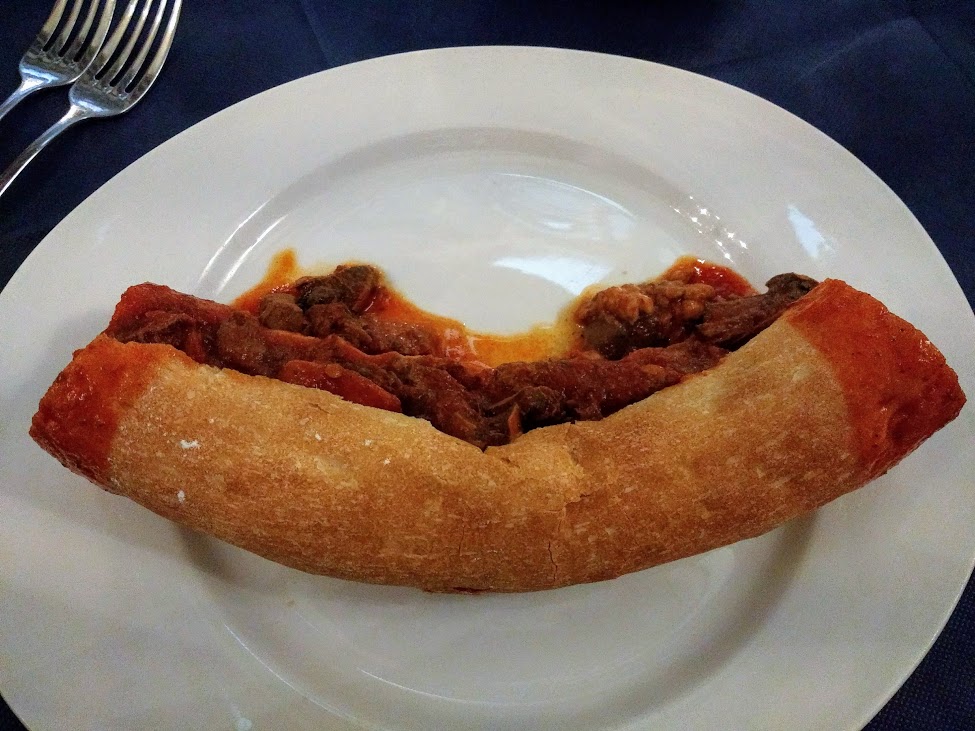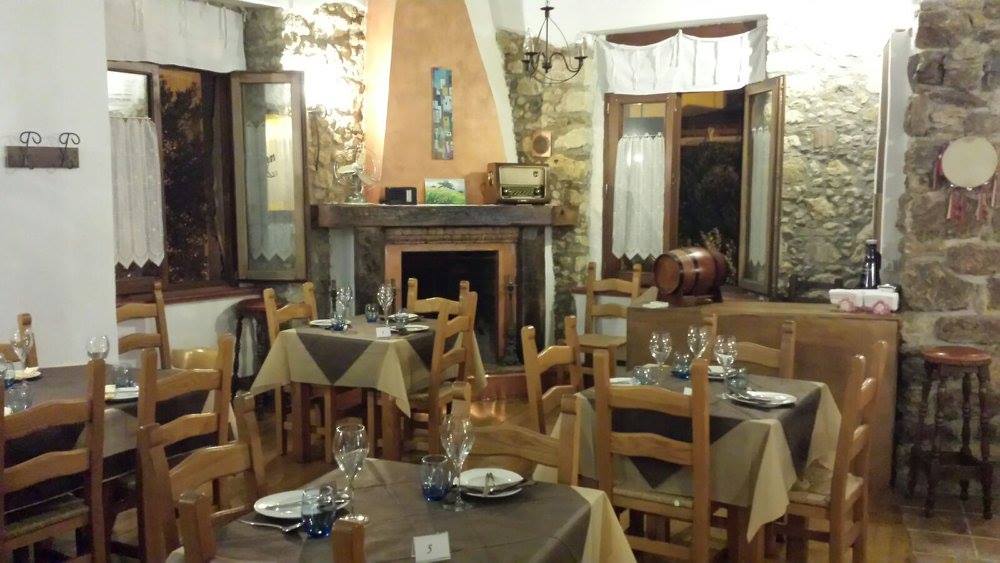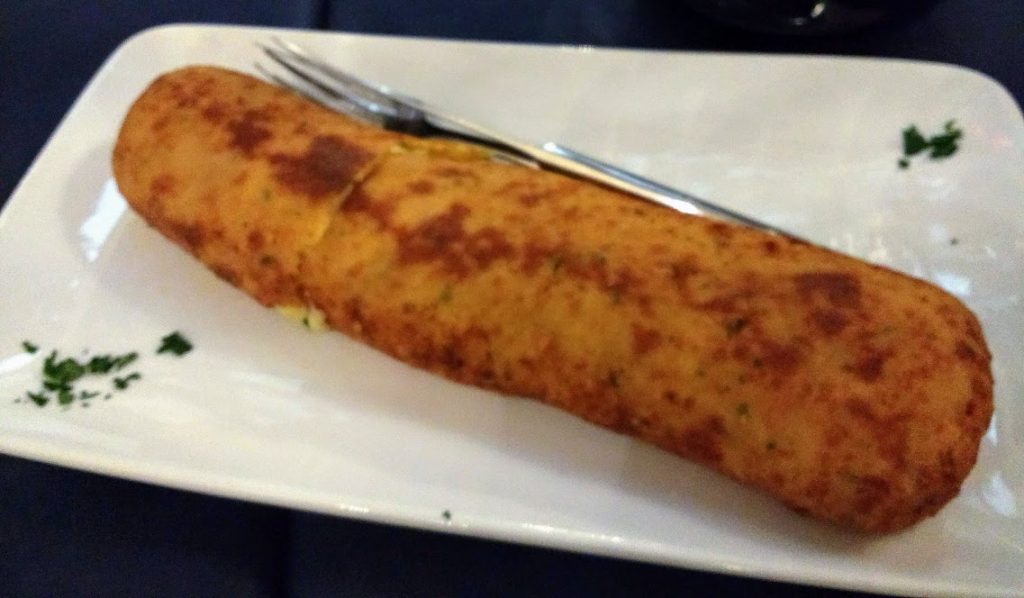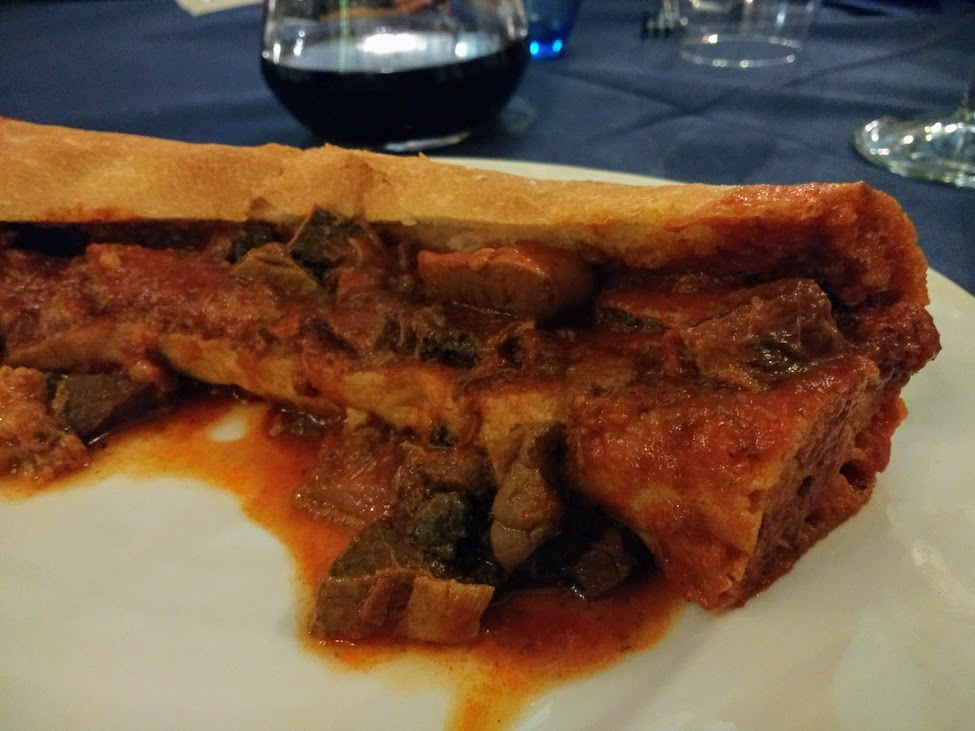Much ado is made over what is referred to as cucina povera, simply put, the cuisine of the poor. These dishes are rooted in tradition and authentically recreate recipes with locally sourced ingredients. Today, patrons of the world’s best restaurants clamor for this tasty, wholesome food of humble origins. In Catanzaro, one such rustic dish has become a symbol of the city, the Morzello di Catanzaro.
LEGEND OF MORZELLO CATANZARESE
In popular lore, the morzello of Catanzaro is attributed to a resourceful widow named Chicchina, who struggled to feed her children. One day before Christmas, she was hired to clean a courtyard, where calves of the well-to-do had been butchered. As Chicchina went about her business, cleaning the blood and gathering the discarded offal, a lightbulb went off in her head. (Perhaps, a candle would have been more in keeping with the period.)
Instead of throwing away the interiors as instructed, she could use them for her Christmas dinner. She would make a meat soup. She chopped the assorted veal innards into little pieces (morzha morzha in Catanzaro dialect), which she boiled in water with tomatoes, peperoncino, salt, oregano and bayleaves. And the morzeddhu was born (morzello in Italian).
Of course, there are other theories as to the dish’s derivation, but the story of Chicchina feels right, especially in the cold weather, such as at Christmastime, when this comfort food warms the spirit.
MORZELLO NELLA PITTA

Morzello nella pitta, Locanda C’era una Volta, Catanzaro
I’m well aware that many reading this will turn up their noses and say that they’ll never eat the stomach, heart, lungs or spleen of an animal. (Vegetarians, cover your ears and divert your eyes.) To all the rest, I say, try it. I’m telling you, it’s delicious. Simmered to perfection in tomato puree with just the right amount of peperoncino calabrese, bay and oregano, the morzello develops a rich, complex flavor with a piquant delicacy.
The traditional way of eating morzello is with a local bread called pitta. Unlike the unleavened pita, this bread is leavened and in the form of a large ring. The pitta is cut into pieces of about eight inches in length, sliced open but not all the way through and stuffed like a sandwich. Although morzello can be presented on a plate as a dinner, eating it with pitta is a time-honored ritual.
Historically, laborers consumed morzello in pitta during mid-morning breaks, but the special sandwich was not reserved for workmen alone. Students as well as the middle and upper classes enjoyed the hearty repast, too.
C’ERA UNA VOLTA IN CATANZARO
Morzello di Catanzaro was traditionally eaten in pubs and inns found in alleys and lanes of old historic centers. Today, the dish is served in trattorias that keep the tradition alive. I recently enjoyed morzello nella pitta at an eatery appropriately named Locanda C’era una Volta or “Once Upon a Time” Inn, located in a beautifully restored building in Catanzaro’s old town. The original stone walls complimented the welcoming, unpretentious interior.

Locanda C’era una Volta, Rione Vallotta, Largo Agricoltori, 34, Catanzaro
Morzello nella pitta kept good company with scaloppina di vitello (veal scaloppine), parmigiana di melanzane (eggplant parmigiana) and polpette di carne al sugo (meatballs in tomato sauce) on the menu. My little party started off splitting an assortment of appetizers, but I was too busy eating and only just got a photo of the crochettone di patate ripieno con la ‘nduja before it was divided. A favorite of my friends’ daughter, the very large croquette with a super smooth potato interior was filled with Calabria’s famous spicy salami, which was an adventurous choice for a middle-schooler.

Crochettone di patate ripieno con la ‘nduja, Giant potato croquette filled with ‘nduja
I wouldn’t have thought a youngster would have considered ordering the morzello, either, but it’s all what you’re used to and the dauntless young lady wanted just that. In Catanzaro, morzello is ricercato (sought-after) by all ages.

Morzello catanzarese, Locanda C’era una Volta, Catanzaro
 Read another story from Catanzaro in my blogpost Wooden Ecclesiastics of the Catanzaro Cathedral or visit an outdoor sculpture park Contemporary Art in the Catanzaro Park of Biodiversity. Or experience a typical dish from Reggio Calabria in Le Frittole: The Pig Boil, Calabrian Style. And for an in-depth look at the beautiful land in the toe of the boot, check out Calabria: The Other Italy, my non-fiction book about daily life, history, culture, art, food and society in this fascinating southern Italian region. It’s available in paperback and e-book versions.
Read another story from Catanzaro in my blogpost Wooden Ecclesiastics of the Catanzaro Cathedral or visit an outdoor sculpture park Contemporary Art in the Catanzaro Park of Biodiversity. Or experience a typical dish from Reggio Calabria in Le Frittole: The Pig Boil, Calabrian Style. And for an in-depth look at the beautiful land in the toe of the boot, check out Calabria: The Other Italy, my non-fiction book about daily life, history, culture, art, food and society in this fascinating southern Italian region. It’s available in paperback and e-book versions.
Would you like to travel to Calabria? Check out the itinerary for my in-depth Calabria Tour.
“Like” Calabria: The Other Italy’s Facebook page and follow me on Karen’s Instagram and Karen’s Twitter for more beautiful pictures and information.
Sign up below to receive the next blog post directly to your email for free.

Comments 14
Really enjoyed reading this post, which reminded me of when my mother used to force us to eat trips, heart, kidney, brains, liver, and everything else.
My Calabrese father loved these meals but I really couldn’t stomach any of it…
I am willing to try this restaurant. It’s a shame, I was only Catanzaro a few weeks’ ago, but living in Cosenza, it’s not that far from me really.
Author
I understand your sentiments as they are strong tastes, but give it one more try. Simmering the meat in the tomatoes, peperoncino and herbs gives the dish a pleasant blend. The pitta is very nice, too.
Hmm…might do one day but at the moment, there are too many more delicious things to savour in Calabria than tripe. 😉
Isn’t it interesting how so many of today’s high-end and/or coveted dishes were usually something relegated to the “peasants” of history? These meals always consist of two things we highly prize in modern society: local and seasonal ingredients. If pitta is unavailable, what would you recommend as a substitute bread?
Author
Yes, so true. From what I’ve read, the ingredients for the bread are fairly standard (500 g. flour, 350 g. water, 12 g. yeast, 30 g. olive oil and a pinch of salt), so if you’re a bread maker, you could make your own – the second rise in a large ring shape. Or look for bread with similar ingredients.
Excellent! Thanks for the bread advice Karen.
I always find it interesting how “cucina povera” has become something that is now featured on fancy restaurant menus. I’ve personally never tried Morzello (and not sure if I would) but I know many who love it. I’m not that adventurous of an eater haha.
Author
This reminds me of many years ago with a friend of the family in a French restaurant in NYC. I came across sweetbreads on a menu for the first time and asked Ed what they were. He insisted I try them. He would order the chicken if I didn’t like them and we could switch. I started eating and they were delicious. Of course, a lot of butter was involved. But then, one of the pieces was strange and I pushed it aside. That’s the brains, I’ll take it, he said. Everyone should have an Ed to go to restaurants with.
Years ago I lived near the Jemez Pueblo in New Mexico. They had an annual Fiesta featuring their local cuisine. They were adept at using every part of an animal and had a dish similar to the Morzello, I think, highly spiced with peppers and made rich and tasty with tomatoes. It was wonderful and served with a bread cooked in a kiva (oven). Guests ate every bit but the squeamish were advised not to ask about the ingredients!
Author
Sounds earthy and delicious. I wonder if you weren’t one of the squeamish…
My mouth is watering just thinking of it! Would love to try it… and everything else you described!
Author
I suppose a trip to Calabria would be in order for you!
I’m not a fan of organ meats, but I am willing to try -except for cervello. My parents tell me I used to eat lots of it till I was 2. They say that is why I am so smart, so I can’t really argue with that, can I? I love reading about cucina povera, it’s a topic I find fascinating! Ciao, Cristina
Author
You certainly can’t argue with logic, especially when brains are the topic, but that sure sounds like a challenging dish for an infant. I thought I was a tough little kid as my regular lunch sandwich was liverwurst on rye through the second grade as I don’t like peanut butter. Then one day, I opened my lunch bag and couldn’t face it anymore.